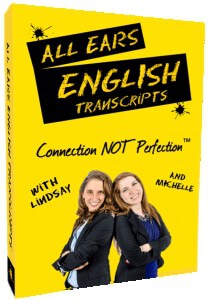If you are like many students, you may wonder what an oxymoron is.
This is such a fun thing to discuss and learn to use.
Today we will discuss oxymorons and give you some really fun ones to use in your conversations.
Once you understand them and how they work, you will begin to notice just how frequently they are used.
Get Your Transcripts Today!

Make sure you understand every word you hear on All Ears English.
Bring your English to the advanced level with new vocabulary and natural expressions.
Subscribe and get the transcripts delivered by email.
Learn to speak naturally with the American accent.
Click here to subscribe and save 50%
Looking At This Common and Fun Part of English
You’ve probably heard them in conversation, but may have never given the a second thought.
What is an oxymoron?
It’s a group of words that are opposites, that contradict and form a meaning.
Sometimes people will note that something is an oxymoron in conversations as a way to connect or find humor with someone.
They are good to know because they are a grouped meaning, they may actually be more like an idiom in nature.
This is because they are defined as a group definition rather than each word working by itself.
Oxymorons are also frequently used in writing, and they date back to Shakespeare as he used oxymorons.
Sometimes it’s more of a phrase, but once you learn these you will notice how frequently they are used in conversations.
Let’s look at some so that you can start to get a true understanding and appreciation of what they are and how they are used.
Common Oxymorons To Understand and Use
There are so many oxymorons out there, and you will probably hear a bunch of them in conversation.
Here we look at a few common ones so that you can get a feeling for which ones you might hear a lot.
- Alone together: This is good for when people are at home. This was actually a hashtag used frequently too.
- Bittersweet: We’ve talked about this such as in episode 1154: Are You Happy? Sad? Or Both? How To Express A Bittersweet Feeling because this is such a common one. You will hear it used quite a bit when something is both.
- Original copy: This may sound crazy but it’s common because sometimes you nee the original. This is good rather than a receipt and sometimes it’s even mandatory. You might say “Can you save the original copy?”
- Awfully good: This means that it’s just so beyond even just good. This takes it to another level. You could say “That meal was awfully good!”
- Old news: This would refer to something that has been relevant for awhile. This is nothing new to you and so this is how you would respond. A good example would be “You didn’t know that they broke up? That’s old news!”
- Pretty ugly: This is beyond something just being bad, and therefore it works well when something is a bit more extreme in nature. “The fight got pretty ugly towards the end. They wouldn’t stop insulting each other.”
- Almost exactly: It’s very similar so it’s almost identical to what you just said or did. You could say “That’s almost exactly what I said–just a few ideas are a bit different!”
- Plastic silverware: This is common these days especially at gatherings or events. It’s much easier to clean up and safer to use. You could say “Let’s use plastic silverware for the party”
- Same difference: This is similar to the one above, and basically means that there is no real difference. A good example would be “Actually the shirt I bought was maroon, not red.” “Eh, same difference”
These are so common and you are likely to hear them used often.
People probably wouldn’t think of these as oxymorons just in regular conversations, but they work quite well.
Oxymorons can be made as well as a joke because they give it that extra boost.
An example might be:
A: “My daughter is such a calm baby
B: “Really? Sounds like an oxymoron to me!”
Takeaway
Try to use oxymorons, and be sure to listen for them in conversation.
Find more because there are many, and we were only able to touch on a few of them today.
They are so much fun and they are more idiomatic than two separate ideas.
Try to bring these up at parties because you might find a lot of these.
They are effective but also a great source of some humor too.
This is a great thing to learn in English, and they are really fun to use!
If you have any questions, please leave them below in the comments section.
We’ll get back to you as soon as we can.








